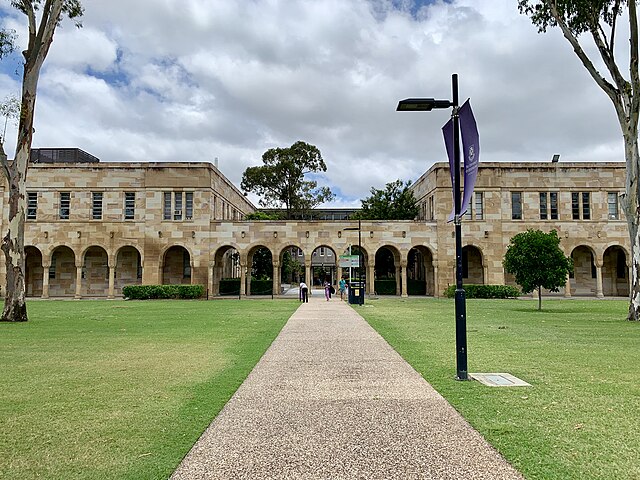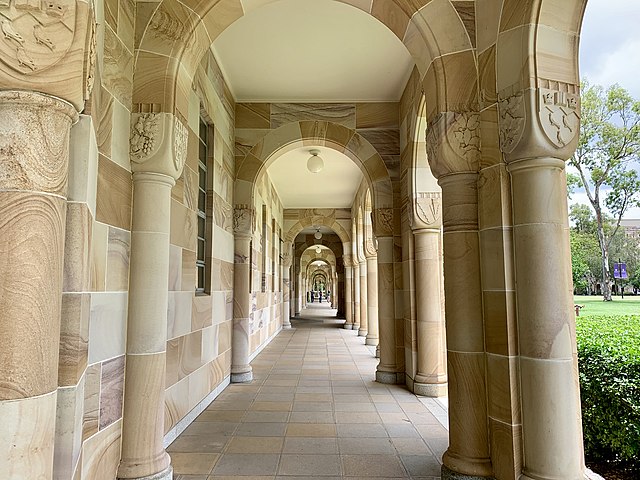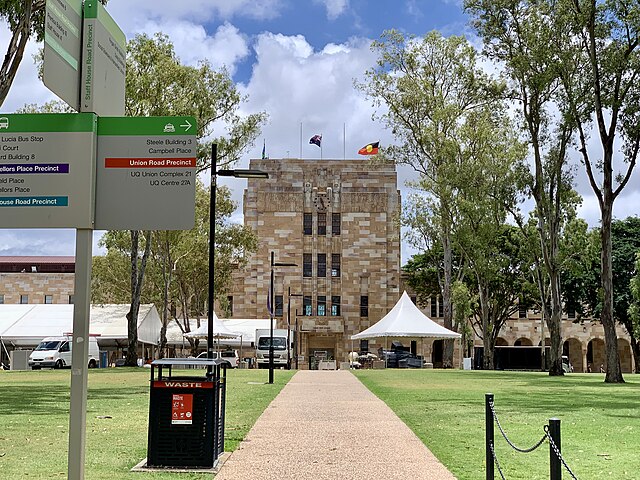
As Thammasat University students grow accustomed to online learning and distance education, some may wish to explore overseas opportunities after they have done their required coursework. Taking an extra class may be informative and help complement main areas of study, giving students new ideas and perspectives and help them to practice their English language usage.
One opportunity to consider may be free massive open online courses (MOOCs) at the University of Queensland, Australia.
The University of Queensland (UQ) is a public research university located primarily in Brisbane, the capital city of the Australian state of Queensland.
The Thammasat University Library collection includes a number of books published by the University of Queensland Press, a distinguished academic publisher.
These include Abdul Haris Nasution: a political biography by C.L.M. Penders and Ulf Sundhaussen, available for loan at the Pridi Banomyong Library, Tha Prachan campus; Adolf Bastian and the psychic unity of mankind: the foundations of anthropology in nineteenth century Germany by Klaus Peter Kopping; and Atheis by Achdiat K. Mihardja, translated from the Indonesian by R.J. Maguire, both also shelved at the Pridi Banomyong Library. Other scholarship from the University of Queensland in the TU Library includes Corruption in the Thai bureaucracy by Lertporn Parasakul, a Ph.D. dissertation available for loan at the Pridi Banomyong Library and Credit and security in Ceylon (Sri Lanka): the legal problems of development finance by Wickrema Weerasooria, shelved in the Sanya Dharmasakti Library, Tha Prachan campus, as well as Credit and security in Japan; the legal problems of development finance by Hisashi Tanikawa and others, copies of which are in the Puey Ungphakorn Library, Faculty of Economics, and the Sanya Dharmasakti Library. The latter library also has a copy of Credit and security in Korea; the legal problems of development finance by Yoon Chick Kwack and others; and Credit and security in Thailand; the legal problems of development finance by Chitti Tingsabadh and others, copies of which are also available for loan at the Boonchoo Treethong Library, Lampang campus, and the Pridi Banomyong Library.
There are many other examples of research produced at the University of Queensland in the TU Library collection.

Among courses available to TU students is Becoming an Effective Leader:
Develop your leadership skills as you learn the importance of self-efficacy, social capital, and leadership style.
About this course
Strong leadership is regarded as one of the best predictors of organizational success and critical human capital required for career progression in almost every organization. However, leadership is also a highly complex and often misunderstood phenomenon. It‘s hard to define, but we all know good and bad leadership when we see it.
This course will equip aspiring leaders with an understanding of what leadership is and how an individual can develop the skills required to become an effective leader in their organization. Taught by instructors and presenters with decades of business and not-for-profit leadership experience, you will learn the difference between leadership and management, the importance of understanding others and building empathy and relationships, and gain a better understanding of the different leadership styles you may encounter throughout your career.
Learn through a series of engaging videos, interviews, case studies, written reflections, peer feedback, and other self-insight activities. Our instructors and faculty will help you identify your own values and ethics as a leader, and most importantly, build your self-efficacy, your confidence and belief in your own ability to achieve intended results.
What you’ll learn
- What leadership means and how have we come to identify what it comprises.
- Leadership styles and the theories behind them.
- The relationship between power and leadership and how to influence others.
- The role of ethics and values in leadership.
- How to become a credible leader and business steward.
- The importance of followership for leader outcomes.
- Develop your leadership skills as you learn the importance of self-efficacy, social capital, and leadership style.
The course instructor will be Mr. Terrance Fitzsimmons, Lecturer in Leadership, The University of Queensland.
As his biography on the UQ website states,
Dr Terry Fitzsimmons is a Senior Lecturer in Leadership with the University of Queensland Business School. He is also a Chartered Accountant with over 30 years of practice. He is the director of the AIBE Centre for Gender Equality in the Workplace and Managing Director of the Australian Gender Equality Council (AGEC), a body whose members comprise of peak national bodies representing women across industry sectors in Australia.
His PhD in Leadership examined successful attributes of CEOs and differing pathways to CEO roles for men and women. In June 2015 Dr Fitzsimmons and Professor Callan released ‘Filling the Pool’ a major report into gender inequality in Western Australia and what government, organisations and individuals can do to address the issue. Dr Fitzsimmons makes extensive use of the work of Pierre Bourdieu and his framework for the examination of persistent intergenerational societal disparity. The concepts of field, capital, habitus and symbolic violence feature heavily in the studies into gender inequality conducted to date.
The TU Library also owns many books on different aspects of the subject of leadership.

Another course possibility for TU students at UQ is Idea Development: Create and Implement Innovative Ideas:
Learn the strategies entrepreneurs and organizations use to create and bring to market innovative ideas.
About this course
To create and bring to market innovative ideas, entrepreneurs invest substantial resources in their creation without being certain their idea will be successful. How do entrepreneurs manage this process? What strategies do they use? What role does the innovativeness of their ideas play in the strategies they adopt? How do they maintain motivation when faced with setbacks?
In this course, we tackle these questions by focusing on:
- Types of innovations and their market impact;
- The importance of taking action, knowledge, learning and resources in the creation of innovative ideas;
- How entrepreneurs make strategic decisions under uncertainty;
- The Management of intellectual property; and
- Maintaining motivation in the face of setbacks
By drawing on the case of Google Glass, their own experiences and ideas, students are encouraged to synthesize knowledge from each Module to gain an in-depth understanding of the complexity of innovation process.
What you’ll learn
- How to come up with innovative ideas you are uniquely position to create and bring to market
- Strategies for managing uncertainty in the creation and implementation of innovative ideas
- How to learn from setbacks and maintain the motivation to persevere when experiencing them
- How ideas and other forms of intellectual property can be protected.
The class will be taught by Ms. Anna Jenkins, Senior Lecturer in Entrepreneurship and Innovation at The University of Queensland.
As her faculty homepage indicates,
Dr Anna Jenkins studies the startup process, the activities and processes which entrepreneurs engage in to explain why some startups emerge successful and growing and others either stagnate or fail. She currently holds an ARC Discovery grant for this project where she is leading a project following the development and trajectories of startups for over four years. She is also leading a research project on the development of startup ecosystems where the research team is conducting a longitudinal ethnographic study on how startup ecosystems emerge.
Her other area of expertise on how small business owners manage setbacks and failure. Her research focuses on how small business owners respond to failure, how they reduce the impact failure can have on their well-being, and the effectiveness of different coping strategies for their well-being and future employment. She was been awarded a number of prestigious research grants for this work including funding from The Swedish Retail and Wholesale Development Council and Swedbank.
She is familiar with a variety of research methods having conducted large scale longitudinal quantitative studies and narrative interviews with small business owners who have failed as well as ethnographic field work and experiments.

(All images courtesy of Wikimedia Commons)
